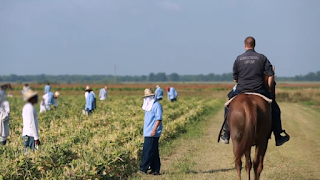Slavery Lives on in the United States
 Frederick Douglass enlightened the minds of mid-19th century Americans to the horrors of slavery. In January of 1865, the 13th amendment was passed and slavery was ended forever. Not really, though.
Frederick Douglass enlightened the minds of mid-19th century Americans to the horrors of slavery. In January of 1865, the 13th amendment was passed and slavery was ended forever. Not really, though.The 13th amendment has a loophole that provides the means of enslaving African Americans to this very day. Section 1 of the amendment states: "Neither slavery nor involuntary servitude, except as punishment for crime whereof the party shall have been duly convicted, shall exist within the United States, or any place subject to their jurisdiction." Did you catch that middle part? Imprisoned persons can be subject to forced labor as part of their sentence. Private, or for-profit, prisons take advantage of this by selling cheap labor, as low as 10 cents per hour, to big corporations. Monetary gain is not exclusive to these private prisons, as this kind of involuntary servitude is commonplace in many federal prisons.Who has bought or continues to buy this labor? Just little companies like Costco and Whole Foods.
What's to be done about a problem with such a long history? Boycotts get everyday-consumers involved at the ground level, but aren't always highly effective. Change in legislation could make a big impact, but is difficult with prison lobbyists' hands on the scale. What rights should be surrendered, if any, when someone is incarcerated? And what would Frederick Douglass do?

Great post, Mimi! To answer your question, I think Frederick Douglass would be writing about this -- just as you are!
ReplyDeleteAnd you might want to check out a terrific Netflix documentary called the "13th." There are some nice parallels to this post in the film.